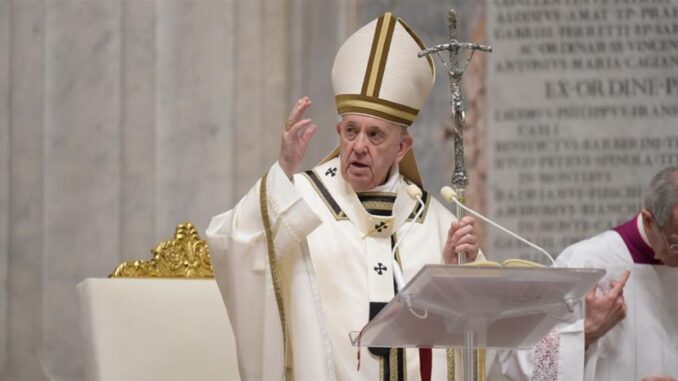
Mary Margaret Schroeder ’20
The coronavirus pandemic has changed our lives in just a few short weeks. Many of our daily activities, like sports practices, school, and hanging out with friends, have been canceled or made virtual to comply with social distancing guidelines. Likewise, important religious events, such as masses, weddings, and funerals, have been altered or canceled. Churches all across the world remain empty as believers stream services from home. The faithful are not able to receive the Holy Eucharist, the focal point in a Catholic Mass. One may ask, what is the pope doing during this crisis? Life in the Vatican is definitely different during these uncertain times. Work continues as normally as possible, though, while adhering to health guidelines. Below are several specific things Pope Francis has done to connect the Catholic community and address the pandemic.
Livestreams: Pope Francis has been live-streaming Mass, the Rosary, Eucharistic Adoration, and other prayer opportunities every day. Watch here: https://www.youtube.com/watch?v=M-RFWoMT574.
Plans for the Aftermath: Pope Francis is working with the Vatican’s Dicastery for the Promotion of Integral Human Development to create a plan to deal with the aftermath of the pandemic.
Blessings: Pope Francis gave 2 special Urbit et Orbi blessings: one at the end of March and one on Easter. Here is the link to the one from March: https://www.youtube.com/watch?v=RvE1ncKned8.
New Prayers: Pope Francis published new prayers for the end to the pandemic, including two prayers to say at the end of the Rosary. Here are the Rosary prayers: http://www.vatican.va/content/francesco/en/letters/2020/documents/papa-francesco_20200425_lettera-mesedimaggio.html.
Important Dates: Pope Francis named May 14 as a day of interreligious prayer, fasting, and charitable works for the end to the pandemic.
In a recent interview, Pope Francis said, “Every crisis contains both danger and opportunity: the opportunity to move out from the danger.” He calls us to recognize our “next door saints,” the brave men and women who selflessly help others: teachers, healthcare workers, priests and nuns, cashiers, janitors, etc. The Church is not a building, it is a universal community of believers. We are called to trust in God and help each other as best we can during this time and always.